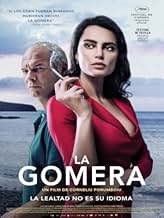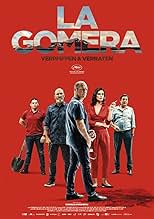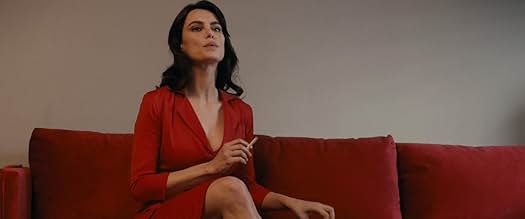IMDb-BEWERTUNG
6,3/10
6873
IHRE BEWERTUNG
Ein Polizist, der beabsichtigt, einen betrügerischen Geschäftsmann aus einem Gefängnis auf Gomera, einer Insel auf den Kanarischen Inseln, zu befreien. Allerdings muss er zuerst den schwieri... Alles lesenEin Polizist, der beabsichtigt, einen betrügerischen Geschäftsmann aus einem Gefängnis auf Gomera, einer Insel auf den Kanarischen Inseln, zu befreien. Allerdings muss er zuerst den schwierigen lokalen Dialekt lernen, eine Sprache, die auch Zischen und Spucken beinhaltet.Ein Polizist, der beabsichtigt, einen betrügerischen Geschäftsmann aus einem Gefängnis auf Gomera, einer Insel auf den Kanarischen Inseln, zu befreien. Allerdings muss er zuerst den schwierigen lokalen Dialekt lernen, eine Sprache, die auch Zischen und Spucken beinhaltet.
- Regie
- Drehbuch
- Hauptbesetzung
- Auszeichnungen
- 11 Gewinne & 18 Nominierungen insgesamt
István Téglás
- Claudiu
- (as István Teglas)
Andrew A. Popescu
- Liviu
- (as Andrei Popescu)
Empfohlene Bewertungen
The maturity of a film school is measured not only by masterpieces or films awarded with gold at major festivals, but also by 'average' movies, belonging to popular genres or film niches. If this criterion is correct, then we can consider Corneliu Porumboiu's 'La Gomera' (English title is 'The Whistlers') as one of these maturity films. Porumboiu is one of the best-known directors of the 'new wave' of Romanian cinema, which has captured the attention of audiences and festival juries a decade and a half ago, initially based on a minimalist approach to the present time and the near past. His films made over the last 14 years are characterized by a variety of styles, genres and themes. Very difficult to predict what the next Corneliu Porumboiu film will look like. With 'La Gomera' the Romanian director walks resolutely in the 'film noir' area writing and making a mafia-themed thriller that manages to capture and keep the viewers' attention by giving them a story that is at the same time original and respectful of all the fundamental rules of the genre.
The story of the film describes a very plausible encounter between the world of gangsters in Western Europe and the relatively new categories of criminals and corrupt lawmakers acquired from the Eastern Europe after the Iron Curtain fell. The hero of the film is Cristi (played by Vlad Ivanov), a corrupt Romanian policeman who gets into deep trouble in a drug trafficking and money laundering business with international implications. The maneuvers of the underground world of criminals bring him to a Canary island where he will be forced to learn the whistling language of the locals to communicate in a coded manner, protected by the electronic interceptions of his pursuers. The original combination of action plans gives Porumboiu the opportunity to suggest to the viewers thoughts about our world super-supervised electronically and deprived of privacy, about the relationship between tradition and modernity, between modern and archaic communication languages.
All these are added atop a classic 'film noir' structure in which the bad guys face the very bad guys, and where the inevitable love story adds to the suspense. There is a lot of blood flowing and plenty of bullets are shot to satisfy genre addicts, but what remains in memory is the consistent, elegant style, full of shadows and sombre colors, backed by an exceptional soundtrack, as well as the professional acting of the entire team of actors. Vlad Ivanov, one of the best theater and film actors of the moment in Romania, consolidates with each new role in films made abroad his stature of international star. He is surounded three actresses who have the opportunity to perform three significant and very well-sketched feminine roles: Catrinel Marlon as the girlfriend, Rodica Lazar as the boss, and Julieta Szönyi as the mother. The story flows well, the motivations of the characters become gradually clear and there are also humorous notes, including quotes from masters and colleagues, directors of suspense movies. 'La Gomera' is a film that can satisfy different categories of viewers. Unfortunately the distribution is kind of discrete, in the cinema hall where I saw the film yesterday we were just four spectators (two couples). I can only hope that the popularity of this movie will increase over time, as I believe it deserves.
The story of the film describes a very plausible encounter between the world of gangsters in Western Europe and the relatively new categories of criminals and corrupt lawmakers acquired from the Eastern Europe after the Iron Curtain fell. The hero of the film is Cristi (played by Vlad Ivanov), a corrupt Romanian policeman who gets into deep trouble in a drug trafficking and money laundering business with international implications. The maneuvers of the underground world of criminals bring him to a Canary island where he will be forced to learn the whistling language of the locals to communicate in a coded manner, protected by the electronic interceptions of his pursuers. The original combination of action plans gives Porumboiu the opportunity to suggest to the viewers thoughts about our world super-supervised electronically and deprived of privacy, about the relationship between tradition and modernity, between modern and archaic communication languages.
All these are added atop a classic 'film noir' structure in which the bad guys face the very bad guys, and where the inevitable love story adds to the suspense. There is a lot of blood flowing and plenty of bullets are shot to satisfy genre addicts, but what remains in memory is the consistent, elegant style, full of shadows and sombre colors, backed by an exceptional soundtrack, as well as the professional acting of the entire team of actors. Vlad Ivanov, one of the best theater and film actors of the moment in Romania, consolidates with each new role in films made abroad his stature of international star. He is surounded three actresses who have the opportunity to perform three significant and very well-sketched feminine roles: Catrinel Marlon as the girlfriend, Rodica Lazar as the boss, and Julieta Szönyi as the mother. The story flows well, the motivations of the characters become gradually clear and there are also humorous notes, including quotes from masters and colleagues, directors of suspense movies. 'La Gomera' is a film that can satisfy different categories of viewers. Unfortunately the distribution is kind of discrete, in the cinema hall where I saw the film yesterday we were just four spectators (two couples). I can only hope that the popularity of this movie will increase over time, as I believe it deserves.
I was fascinated with the whistling communication from old times and the whole web of gangsters involved into it, maybe not very spectacular action but entertaining for sure.
There is not much choice nowadays, mostly movies are propaganda, so I enjoyed this piece of movie art. Quite unique style, slowly developing and realistically looking characters.
It's actually a co-production, but mostly Romanian. I could say is the first Romanian film made intelligently, for international distribution. Of course, it's not a masterpiece, by far, but, compared to the previous level of Romanian films, it's a great qualitative leap. Vlad Ivanov, the lead, is almost an expressionless actor. I can't say the same about Catrinel Marlon, she is very expressive, dressed and undressed. Talented and very beautiful, a face reminiscent of Penelope Cruz and Nastassja Kinski, Catrinel Marlon I hope she'll become a great actress. Very convincing Rodica Lazar in the role of the very annoying prosecutor. The rest of the cast is good, the movie is worth to be seen. Porumboiu surpasses himself from one film to another. I wish him to keep it that way, higher and higher.
First Hit: I was, and even a day later, confused by this story and film.
We're really introduced to Cristi (Vlad Ivanov) and Gilda (Catrinel Marlon) when Gilda walks up to Cristi and asks to speak with him in his apartment. Cristi whispers into her ear that he apartment is bugged, so she kisses him and tells him she'll play the part of a hooker, and they can whisper her request, which is to help her by getting a criminal, Zsolt, out of prison.
In an early scene, Cristi is on a ferry heading to an island where the ancient people use to communicate by whistling. Cristi is part of a plot working with other criminals to free Zsolt and to do this he has to learn the whistling language.
The language breaks vowels and consonants into seven whistling sounds. This lesson in this language was the most exciting part of the film. I was fascinated with Cristi learning how to whistle and wanted to practice, along with him, right in the theater.
As the film develops, some parts led me to believe that the story in the movie was pre-planned, and I missed something as the film progressed. At other times, I felt as though Cristi and Gilda were planning the ending along the way because they'd fallen for each other.
As an undercover detective, Cristi works for an unnamed woman place by Rodica Lazar, who is trying to play both ends of this story.
The result is a film that has the appearance of a storyline running at two different levels, but in the end, the person sitting next to me asked if he missed something about how the ending worked out, I said "I don't know," and I still don't.
Ivanov was quietly compelling as the detective who was also on the take. Marlon was excellent as the woman who seemed totally in control of story behind the plot. Lazar was strong as the head of the investigation and also susceptible to corruption. Corneliu Porumboiu wrote and directed this quizzical story that left me hanging.
Overall: I either missed a critical section of this Romanian film or the story was attempting to be too elusive.
We're really introduced to Cristi (Vlad Ivanov) and Gilda (Catrinel Marlon) when Gilda walks up to Cristi and asks to speak with him in his apartment. Cristi whispers into her ear that he apartment is bugged, so she kisses him and tells him she'll play the part of a hooker, and they can whisper her request, which is to help her by getting a criminal, Zsolt, out of prison.
In an early scene, Cristi is on a ferry heading to an island where the ancient people use to communicate by whistling. Cristi is part of a plot working with other criminals to free Zsolt and to do this he has to learn the whistling language.
The language breaks vowels and consonants into seven whistling sounds. This lesson in this language was the most exciting part of the film. I was fascinated with Cristi learning how to whistle and wanted to practice, along with him, right in the theater.
As the film develops, some parts led me to believe that the story in the movie was pre-planned, and I missed something as the film progressed. At other times, I felt as though Cristi and Gilda were planning the ending along the way because they'd fallen for each other.
As an undercover detective, Cristi works for an unnamed woman place by Rodica Lazar, who is trying to play both ends of this story.
The result is a film that has the appearance of a storyline running at two different levels, but in the end, the person sitting next to me asked if he missed something about how the ending worked out, I said "I don't know," and I still don't.
Ivanov was quietly compelling as the detective who was also on the take. Marlon was excellent as the woman who seemed totally in control of story behind the plot. Lazar was strong as the head of the investigation and also susceptible to corruption. Corneliu Porumboiu wrote and directed this quizzical story that left me hanging.
Overall: I either missed a critical section of this Romanian film or the story was attempting to be too elusive.
Wusstest du schon
- WissenswertesDirector Corneliu Porumboiu's largest budget to date. He estimated the budget to be about two-and-a-half times what he usually works with, or all his prior films combined, making financing difficult.
- VerbindungenFeatures Der schwarze Falke (1956)
- SoundtracksThe Passenger
Written by Iggy Pop (as Osterberg James Newell Jr) and Ricky Gardiner
Performed by Iggy Pop
Top-Auswahl
Melde dich zum Bewerten an und greife auf die Watchlist für personalisierte Empfehlungen zu.
- How long is The Whistlers?Powered by Alexa
Details
- Erscheinungsdatum
- Herkunftsländer
- Offizielle Standorte
- Sprachen
- Auch bekannt als
- The Whistlers
- Drehorte
- La Gomera, Canary Islands, Spanien(on location)
- Produktionsfirmen
- Weitere beteiligte Unternehmen bei IMDbPro anzeigen
Box Office
- Bruttoertrag in den USA und Kanada
- 55.608 $
- Eröffnungswochenende in den USA und in Kanada
- 20.458 $
- 1. März 2020
- Weltweiter Bruttoertrag
- 809.445 $
- Laufzeit
- 1 Std. 37 Min.(97 min)
- Farbe
- Seitenverhältnis
- 2.39 : 1
Zu dieser Seite beitragen
Bearbeitung vorschlagen oder fehlenden Inhalt hinzufügen


![Trailer [English SUB]](https://m.media-amazon.com/images/M/MV5BMDA1Y2E3MzctMGY3MS00ZDMzLThmZGQtYTE1ZDc5ZGYxYjRhXkEyXkFqcGdeQXRyYW5zY29kZS13b3JrZmxvdw@@._V1_QL75_UX500_CR0)
![Trailer [OVS]](https://m.media-amazon.com/images/M/MV5BMTU5YjIzYWEtMTQ0Ni00NzVjLWIwOWUtNWNhNzJkYTU5ZTA0XkEyXkFqcGdeQXRyYW5zY29kZS13b3JrZmxvdw@@._V1_QL75_UY281_CR86)
































